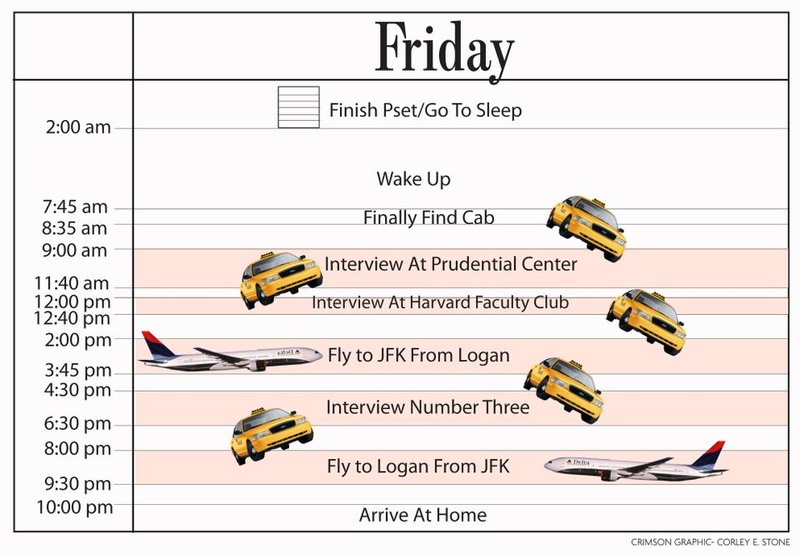It’s a Friday. After pulling an all-nighter to finish his math problem set, Sanjay P. Misra ’12 leaves Adams House at 8:15 a.m. for his 9 a.m. consulting interview at the Prudential Center. It takes him 20 minutes to find a cab, which brings him to his interview three minutes before it starts.
At 11:40 a.m. Misra sprints out, jumps into a cab, and barely arrives in time for his 12 p.m. interview at the Harvard Faculty Club.
Forty minutes later he is again in a cab, this time on his way to Logan Airport to catch a 2 p.m. flight to New York.
The plane lands at 3:45 p.m., giving Misra just about enough time to get to his third interview at 4:30 p.m. When Misra finishes the last interview, he rushes out to grab the fifth cab of the day, so that he could catch a flight back to Boston at 8 p.m.
“I hadn’t eaten all day, and I hadn’t slept, it was just very stressful,” Misra says, shaking his head. “When I got back [to Cambridge], I had a cab driver drop me in front of Felipe’s. I almost passed out there.”
Misra’s recruiting schedule may seem excessive even for the average overworked Harvard student. Yet for the about 33 percent of the class of 2012 that was involved in on campus recruiting this past month, full days of interviews and day-trips to cities of potential employers are simply the norm. Recruiting can put a strain not only on students’ academics, but also on their social life and mental health.
FALLING BEHIND IN ACADEMICS
One of the biggest challenges for students who are doing recruiting is coordinating schoolwork and interviews. Even though students may try to avoid schedule conflicts, many say missing a few classes often is still inevitable.
“If you get the opportunity to interview, you want to take it because you are risk-averse. You don’t know what position you are going to get, so you want to interview as much as you can,” Benjamin L. Enowitz ’12 says, adding that he has missed numerous classes during recruiting season.
Adam J. Arthurs ’12 initially planned to submit applications at 64 companies—but ended up applying for 20 to 30—and simply did not go to class during the first two weeks of recruiting.
“Academics is the hardest part, because you are basically not a student at Harvard.” says Misra. In order to catch up, Misra spent a significant amount of time studying on his own and attended office hours for help.
According to Misra, although most of his teaching fellows and professors are understanding and supportive, not all of them are equally flexible with their classes and schedules.
For Misra’s class “Japanese History 145: Lady Samurai in Medieval Japan,” the professor held a make-up session for all students who missed class during that week. But another of Misra’s courses permits only one absence in section, after which students must write a five-page paper for each additional absence.
One common solution to minimize damage to academics is to pick classes strategically, students say. Some choose courses that have easier content, more flexible schedules, and are conducted in lecture format as opposed to sections or seminars—but this solution significantly limits students’ course options.
The ways in which juniors must limit their courses to accommodate recruiting is unfortunate, says Jennifer A. Xia ’12, recounting the story of a friend who ended up taking three classes at the end of recruiting season, one of which was pass-fail.
Read more in News
Allston Remains High Priority for University













